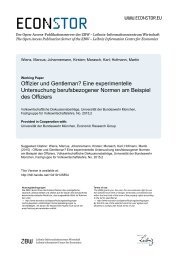DISCUSSION
n?u=RePEc:iza:izadps:dp10283&r=exp
n?u=RePEc:iza:izadps:dp10283&r=exp
You also want an ePaper? Increase the reach of your titles
YUMPU automatically turns print PDFs into web optimized ePapers that Google loves.
Khwaja, A., Silverman, D., and Sloan, F. (2007). Time preference, time discounting, and<br />
smoking decisions. Journal of Health Economics, 26(5): 927–949<br />
Koch, A.K. and Nafziger, J. (2011). Self-regulation through goal setting. Scandinavian<br />
Journal of Economics, 113(1): 212–227<br />
Koch, A.K. and Nafziger, J. (2016). Goals and bracketing under mental accounting. Journal<br />
of Economic Theory, 162: 305–351<br />
Laibson, D. (1997). Golden eggs and hyperbolic discounting. Quarterly Journal of Economics,<br />
112(2): 443–477<br />
LaPorte, R.E. and Nath, R. (1976). Role of performance goals in prose learning. Journal of<br />
Educational Psychology, 68(3): 260–264<br />
Latham, G.P. and Brown, T.C. (2006). The effect of learning vs. outcome goals on selfefficacy,<br />
satisfaction and performance in an MBA program. Applied Psychology, 55(4): 606–<br />
623<br />
Latham, G.P. and Pinder, C.C. (2005). Work motivation theory and research at the dawn<br />
of the twenty-first century. Annual Review of Psychology, 56(1): 485–516<br />
Lavecchia, A.M., Liu, H., and Oreopoulos, P. (2016). Behavioral economics of education:<br />
Progress and possibilities. In E.A. Hanushek, S. Machin, and L. Woessman, editors, Handbook<br />
of the Economics of Education, Vol. 5, 1–74. North Holland<br />
Leuven, E., Oosterbeek, H., and Klaauw, B. (2010). The effect of financial rewards on<br />
students’ achievement: Evidence from a randomized experiment. Journal of the European<br />
Economic Association, 8(6): 1243–1265<br />
Linnenbrink-Garcia, L., Tyson, D.F., and Patall, E.A. (2008). When are achievement<br />
goal orientations beneficial for academic achievement? A closer look at main effects and<br />
moderating factors. Revue Internationale de Psychologie Sociale, 21(1): 19–70<br />
Locke, E.A. (1968). Toward a theory of task motivation and incentives. Organizational Behavior<br />
and Human Performance, 3(2): 157–189<br />
Locke, E.A. and Latham, G.P. (2002). Building a practically useful theory of goal setting<br />
and task motivation: A 35-year odyssey. American Psychologist, 57(9): 705–717<br />
Locke, E.A., Shaw, K.N., Saari, L.M., and Latham, G.P. (1981). Goal setting and task<br />
performance: 1969–1980. Psychological Bulletin, 90(1): 125–152<br />
McLeish, K.N. and Oxoby, R.J. (2007). Gender, affect and intertemporal consistency: An<br />
experimental approach. Discussion Paper 2663, IZA<br />
Meier, S. and Sprenger, C. (2010). Present-biased preferences and credit card borrowing.<br />
American Economic Journal: Applied Economics, 2(1): 193–210<br />
Mento, A.J., Steel, R.P., and Karren, R.J. (1987). A meta-analytic study of the effects of<br />
goal setting on task performance: 1966–1984. Organizational Behavior and Human Decision<br />
Processes, 39(1): 52–83<br />
Miller, C., Binder, M., Harris, V., and Krause, K. (2011). Staying on track: Early findings<br />
from a performance-based scholarship program at the university of New Mexico. Technical<br />
Report, MDRC<br />
Morgan, M. (1987). Self-monitoring and goal setting in private study. Contemporary Educational<br />
Psychology, 12(1): 1–6<br />
Morisano, D., Hirsh, J.B., Peterson, J.B., Pihl, R.O., and Shore, B.M. (2010). Setting,<br />
elaborating, and reflecting on personal goals improves academic performance. Journal of<br />
Applied Psychology, 95(2): 255–264<br />
Park, Y.J. and Santos-Pinto, L. (2010). Overconfidence in tournaments: Evidence from the<br />
field. Theory and Decision, 69(1): 143–166<br />
Patel, R. and Rudd, T. (2012). Can scholarships alone help students succeed? Lessons from<br />
two New York City community colleges. Technical Report, MDRC<br />
35




